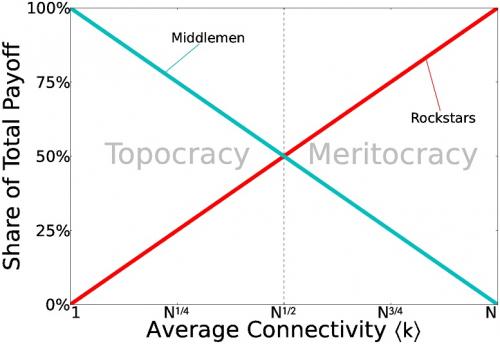As western economies struggle to emerge from recession, there has been a growing sense of unease concerning the apparent inequalities in the developed world. The Occupy movement are the obvious poster boys, but a growing number of commentators have been wondering out loud about the impact technology is having on the way wealth is distributed throughout society.
The Economist for instance had a special feature recently exploring the future of jobs, and in particular whether the considerable technological changes we are living through are translating into increased wealth for all sections of society. It’s a meme that Andrew McAfee and Erik Brynjolfsson pick up on their forthcoming book The Second Machine Age.
The apparent inequality of the web is also a theme explored by Jared Lanier in Who Owns the Future, in which he suggests that much of the wealth generated by the Internet is focused on those who own and operate the platforms that come to dominate the web environment. They get very wealthy whilst other workers get gradually poorer as more of their work is either done cheaply or for free.
Whilst it has seen a lot of popular attention, it hasn’t really been an issue given a great deal of academic attention thus far, which makes a new paper recently published in Scientific Reports so interesting.
The study sees researchers construct a model in which people can earn money in one of two ways. They can either produce content, or they can distribute content produced by others. The researchers believe a system whereby more money is earned by production than by distribution is more meritocratic. When the reverse is the case, it’s distribution is more topocratic.
So, hypothesis established and rules set, the researchers set about testing their theory that densely connected networks are more meritocratic. They used various analytical tools from network science to calculate when a network tips from one state to the other. This threshold depends primarily on both the connectivity of the network, and how income is distributed between content producers and middlemen. A basic heuristic is that if one or more people stand between buyer and seller, then the system is topocratic.
So how does the Internet do? Contrary to the ominous predictions by Lanier et al, the model suggests that the web is actually a force for good in terms of income distribution, because of its ability to allow people to market and trade either with each other, or through a single large mediator (ie eBay). This, they suggest, makes the web a more meritocratic place as the number of intermediaries is lower than in less connected ecosystems.
Although the researchers see the meritocratic structure as favourable to the topocratic one, they caution that denser networks are not always preferable to sparser networks. For instance, sparser networks may better preserve cultural diversity and limit the spread of disease, among other benefits. In addition, previous research has shown that sparse networks prevent free-riders from prospering because of their limited direct connections. When free-riders must go through a middleman to exploit another individual, the middlemen may play the crucial role of enhancing cooperation.
So, whilst it remains to be seen how technologies such as the web will influence incomes over the next few years, this paper suggests that things aren’t all bad.
